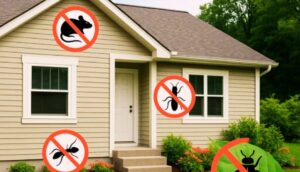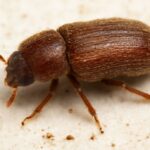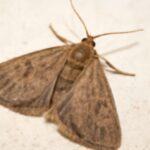Why Is Pest Control Important?

Creating a pest-free environment will produce a stress-free environment. Whether you’re dealing with structural pests (home) or garden pests, one thing is clear: Indoor or outdoor pests will make their presence felt. These pests are responsible for millions of dollars in damages each year, and to make matters worse, many of them are known to carry diseases that can lead to various health-related illnesses. Rodents and insect pests are not concerned about the time and money invested to create your castle (home) or garden oasis.
When pests and rodents show up at your doorstep, they have four things in mind: food, a water source, shelter, and a place to raise their young. If their presence is ignored, it can lead to an infestation that can become difficult to manage.
At the first sign of pests and rodents quick action should be taken to stamp them out or better yet preventive measures should be put in place to discourage rodents and pests from your home and garden but if they show up before preventative measures are in place then following the steps that are laid out in this guide will equip you with the knowledge that is needed to win the war on various pest issues. Take action now to stop these uninvited guests or give us a call and let us take care of your pest issues, creating a pest-free zone.
To Prevent Serious Health Problems
Common home pests such as mosquitoes, cockroaches, fleas, and ticks are responsible for carrying the Zika virus, malaria, West Nile virus, and dengue fever. House flies are transmitters of anthrax, typhoid fever, poliomyelitis, dysentery, leprosy, cholera, tularemia, tuberculosis, tularemia, and yaws. Rats are rodents and are known to be the carriers of various diseases, for example, salmonellosis, hantavirus, leptospirosis, lymphocytic choriomeningitis, and rat bite fever. Bedbug bites can lead to allergic reactions, itching, secondary skin infections, insomnia, and swelling.
To Protect Your Home From Damage
The presence of rats and mice is a cause for alarm, rats and mice will gnaw (chew) on drywall, wood, clothes, plastic, anything made out of paper, fiberglass-based screening, rubber, low gauge aluminum, soft vinyl, electrical wiring that can cause fire, soap, etc.. both rats and mice cause thousands of dollars in home damage. There are around 2,705 to 2,972 known species of termites worldwide. Of this number, the 3 common types that can be found in a home environment are drywood termites, dampwood termites, and subterranean termites.
Of the 3 common house termites subterranean are more difficult to control and can cause thousands of dollars in house repair, termites cause damage by consuming the cellulose in wood weakening walls, floors, and the foundation.
To Ensure Your Pets Maintain Good Health

Fleas and ticks can negatively impact our pets by transmitting diseases such as bartonellosis, Rocky Mountain spotted fever, anaplasmosis, Lyme disease, Canine Anaplasmosis, Canine Bartonellosis, Canine Ehrlichiosis, and Canine Babesiosis. Signs that may indicate that your dog might have been bitten by fleas and ticks are biting skin, excessive scratching, red or irritated skin, and hair loss. If your pet has these symptoms, seek help from a veterinarian as soon as possible.
To Prevent Infestation
At the first sign of pest issues take quick action, because a delay in responding can lead to an infestation that will compound the problem leading to health-related illness and property damage. Addressing pest issues at the onset is far cheaper than taking on an infestation that could have been avoided if quick action had been taken from the beginning.
To Safeguard Against Food Contamination
Pest will contaminate food items, roaches, rats, flies, mice, and pantry bugs are the culprits, it is estimated that pest damage of food items on average costs billions of dollars in damage annually. If these foods are consumed will lead to health-related issues.
To Maintain Food Supply

Garden pests can reduce the quality of crops along with contamination, agricultural crops are not only being negatively impacted by pests but home gardens as well. Garden pests will also damage flowering and ornamental plants. Putting a pest management plan in place will ensure that garden pests are controlled and food crops remain free from contamination.
To Help Save Money
Managing your pest issues will save you from headaches as well as spending your hard-earned dollars needlessly. Whenever an infestation is avoided or brought under control will pay off in big ways.
To Secure And Enjoy A Pest-Free Environment
A pest-free environment is a stress-free environment, as you enjoy your investment both in your home and your garden. An environment that is free of rats, roaches, mosquitoes, etc… is an environment that is not only healthy but an environment that is inviting. Ongoing treatment can create a stable barrier against pests that is a win-win for you.
How Pests Operate
Managing the presence of pests is not a one-time deal, pest management is an ongoing process that will keep you, your pet, and your environment safe. The habitat of pests is influenced by the changing of seasons.
- Spring is an active time for pests because during winter, pests for the most part go into a rest period. Once the warmer months arrive, they will emerge from hiding in search of food, a water source, and a place to raise their young, as this time of the year is the time for mating
- Summertime with its many days of rain, will drive pests to our homes and gardens seeking shelter from not only wet conditions but also the extreme heat.
- Fall months will drive pests indoors as they seek a haven as the temperature drops.
- Winter months will cause pests’ activity to slow down as they seek refuge from the harsh winter chill. This is the time of the year that allows the opportunity to get a jump start on pests before they become active once the warmer months return by making repairs and sealing holes in cracks and crevices.
10 Frequently Asked Questions (FAQs)
1. Why is pest control important for my home?
Pest control are methods that are used to help keep your home and garden safe, clean, and comfortable. It prevents infestations that can cause property damage, spread disease, or trigger allergies. Whether it’s ants in the kitchen or termites in the walls, pest control stops the problem before it gets out of hand.
2. Can pest control actually save me money?
Yes, big time! Preventative pest control is usually much cheaper than repairing damage caused by pests. For example, termites and rodents can cause thousands of dollars in structural damage if left unchecked. Regular treatments help avoid surprise repair bills.
3. Is pest control safe for my kids and pets?
Absolutely! Most professional pest control companies use EPA-approved products and offer pet- and child-safe treatments. Plus, many services now offer natural or organic pest control options for extra peace of mind. Just follow any safety instructions provided by the technician.
4. How does pest control help protect my health?
Many pests carry bacteria, parasites, or allergens. Roaches can trigger asthma, mosquitoes are known to spread diseases, and rodents carry viruses. Pest control reduces these health risks by removing or repelling these pests from your living space.
5. Do I still need pest control if I keep my house clean?
Even the cleanest homes can attract pests! Food crumbs, moisture, and entry points can invite ants, roaches, or mice. Regular cleaning definitely helps, but professional pest control adds a protective barrier to keep unwanted guests out for good.
6. What are the benefits of ongoing pest control vs. one-time treatment?
Ongoing pest control offers continuous protection against seasonal pests and long-term threats. It:
-
Stops infestations early
-
Prevents re-infestation
-
Offers peace of mind year-round
One-time treatments are helpful, but regular service plans keep pests from coming back.
7. Can pest control improve my home’s resale value?
Yes! A pest-free home is more attractive to buyers and can pass inspections with flying colors. Termite reports, for example, are often required before selling. Ongoing pest control can also extend the life of your home’s structure and systems.
8. Are there natural or eco-friendly pest control options?
Definitely. Many companies offer green pest control solutions using essential oils, diatomaceous earth, and other natural ingredients. These options are great for eco-conscious homeowners or families with young kids and pets.
9. How fast can I see results from pest control?
Results can be almost immediate, especially with contact-kill treatments for bugs like ants or roaches. However, some pests take a few days or follow-up visits to fully eliminate. Your technician will let you know what to expect based on your specific situation.
10. Is pest control worth it if I haven’t seen any bugs yet?
Yes—it’s actually the best time to act! Preventative pest control keeps infestations from starting in the first place. Just because you don’t see pests doesn’t mean they’re not hiding in walls, attics, or crawlspaces. Prevention is always easier (and cheaper) than a cure.
Conclusion
Home and garden pest management is possible, you can win the war on these pests, all it takes is some know (knowledge) how. This guide is here to help you; no matter the level of infestation you are facing, you can gain control and have success. All it takes is putting a plan in place by taking quick action, give us a call today, and let us help you create a pest-free zone by winning the war on structural and garden pests.








